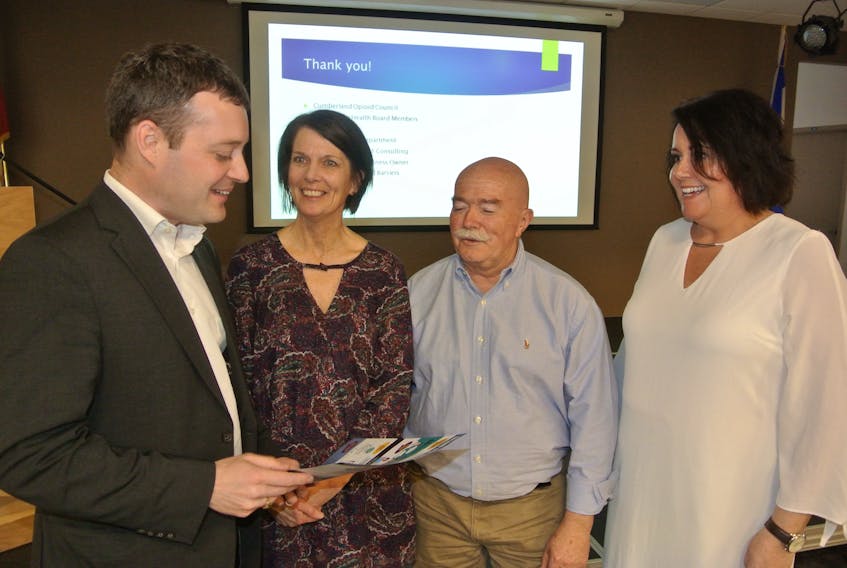AMHERST – One of the problems with battling opioid abuse is making people aware that it’s even an issue.
Cumberland County’s opioid council has announced the findings of an investigation of the community’s readiness to implement harm reduction strategies for those individuals addicted to opioids in the region.
The investigation, that interviewed nine community members about opioid abuse, saw the community’s readiness score at 1.74 out of 10 when it comes to knowledge about current opioid use programs or efforts and opioid use as well as the attitudes of leadership, the community and the resources being spend on harm prevention.
“It shows we have lots of work to do, but our situation is not any different than the rest of the province,” council member Sandi Partridge said. “What the model indicates we have to do is laid out for us and we’ll look at that in the context of Cumberland County. Basically, we have to work on raising awareness, building capacity and sharing personal stories that people can relate to.”
The analysis found people don’t see opioid addiction as a rural problem. It also suggested those who use opioids are also addicted to powerful drugs, while it found awareness of harm reduction initiatives like needle exchange, naloxone kits and methadone maintenance programs is low.
It also found that community leaders either aren’t aware or don’t want to take action, while suggesting the problem is going to get worse if nothing is done.
Partridge said part of the effort will be to make community leaders, including physicians, aware of the resources that are available.
Also, with the partnership with the Northern Health Connections Society, the organization will look to bring programs such as the needle exchange and the lock box to the area. The first lock box, for people to safely dispose of syringes, has already been located at the rear of Breakfast at Brittney’s thanks to the support of business person Jeff Bembridge.
The box is completely anonymous and there’s no surveillance to see who is using it.
Health Minister Randy Delorey was in attendance for the presentation and admitted to not being surprised by the results.
“One of the issues is raising awareness and it’s something that we in government are becoming more aware of, particularly in public health,” the minister said following the meeting. “The stigma associated with addictions makes a lot of people think it’s someone else’s problem or a big city problem.”
The minister said it’s an issue in Nova Scotia, where there are approximately 60 deaths a year related to opioid abuse and it’s something his department is committed to addressing.
“We’re excited about the work the opioid council is doing here to bring attention and awareness to help minimize the risks so that families don’t have to experience the tragedies others have experienced in this province and across the country.”
The minister said the opioid framework released last August sets the path for a provincial response to the issue. He said it’s a multi-faceted approach that places priority on education and harm reduction.
The success of that framework depends on the efforts of groups such as Cumberland County’s opioid council and the Northern Healthy Connections Society.
“Because of stigmas, sometimes people don’t feel comfortable sharing information or having a conversation with government,” the minister said. “Having a community organization be that bridge to ensure people get help is so important.”
Amherst Mayor David Kogon said he was a little surprised by the result in that it shows the scope of the problem is bigger than he thought.
“I’ve dealt with a lot of addicted patients in my obstetrical practice for many years. Young girls would be addicted and get pregnant. They would be on methadone and we would help them get through their problem,” Kogon said. “Methadone is a healthier way to deal with an addiction, but needle programs and preventing the spread of infectious diseases are important.”
He said the fact Amherst is being identified as a growing hotspot for opioid abuse sends a message that the community must be proactive. He sees the council as playing a role in raising awareness and educating the public.
Twitter: @ADNdarrell









